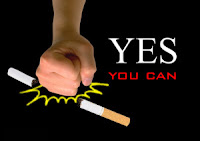Once you stop smoking, you will experience a number of physical symptoms as your body withdraws from nicotine. Nicotine withdrawal begins quickly, usually starting within thirty minutes to an hour of the last cigarette and peaking about 2 to 3 days later. Withdrawal symptoms can last for a few days to several weeks and differ from person to person.
Common nicotine withdrawal symptoms include:
- Cigarette cravings
- Irritability, frustration, or anger
- Anxiety or nervousness
- Difficulty concentrating
- Restlessness
- Increased appetite
- Headaches
- Insomnia
- Tremors
- Increased coughing
- Fatigue
- Constipation or upset stomach
- Depression
- Decreased heart rate
 |
| Craving for smoke |
How to Quit Smoking: Manage Cigarette Cravings
Avoiding smoking triggers will help reduce the urge to smoke, but you can't avoid cravings entirely. But cigarette cravings don't last long, so if you're tempted to light up, remember that the craving will pass and try to wait it out. It also helps to be prepared in advance. Having a plan to cope with cravings will help keep you from giving in.
- Distract yourself. Do the dishes, turn on the TV, take a shower, or call a friend. The activity doesn't matter as long as it gets your mind off of smoking.
- Remind yourself why you quit. Focus on your reasons for quitting, including the health benefits, improved appearance, money you're saving, and enhanced self-esteem.
- Get out of a tempting situation. Where you are or what you're doing may be triggering the craving. If so, a change of scenery can make all the difference.
- Reward yourself. Reinforce your victories. Whenever you triumph over a craving, give yourself a reward to keep yourself motivated.
 |
| Self Motivation |
 |
| Don't temp yourself |
 |
Coping with Cigarette Cravings in the Moment
Find an oral substitute
Keep other things around to pop in your mouth when cravings hit. Good choices include mints, hard candy, carrot or celery sticks, gum, and sunflower seeds.
Keep your mind busy
Read a book or magazine, listen to some music you love, do a crossword or Sudoku puzzle, or play an online game.
Keep your hands busy
Squeeze balls, pencils, or paper clips are good substitutes to satisfy that need for tactile stimulation.
Brush your teeth
The just-brushed, clean feeling can help get rid of cigarette cravings.
Drink water
Slowly drink a large, cold glass of water. Not only will it help the craving pass, but staying hydrated helps minimize the symptoms of nicotine withdrawal.
Light something else
Instead of lighting a cigarette, light a candle or some incense.
Get active
Go for a walk, do some jumping jacks or pushups, try some yoga stretches, or run around the block.
Try to relax
Do something that calms you down, such as taking a warm bath, meditating, reading a book, or practicing deep breathing exercises.
Medication and therapy to help you quit smoking
There are many different methods that have successfully helped people to quit smoking, including:
- Systematically decreasing the number of cigarettes you smoke.
- Reducing your intake of nicotine gradually over time.
- Using nicotine replacement therapy or non-nicotine medications to reduce withdrawal symptoms.
- Utilizing nicotine support groups.
- Trying hypnosis, acupuncture, or counseling using cognitive behavioral techniques.
You may be successful with the first method you try. More likely, you’ll have to try a number of different methods or a combination of treatments to find the ones that work best for you.
 |
| Grab a hand of theirs, they need your support |
For more health info and promotions, please follow us on Facebook- Wellness Lab
 |
| Download Wellness Lab Mobile App now for more promotions |
If you like this article, you can share this to your friends and families , together we share the health information and the taste of a healthy life!







